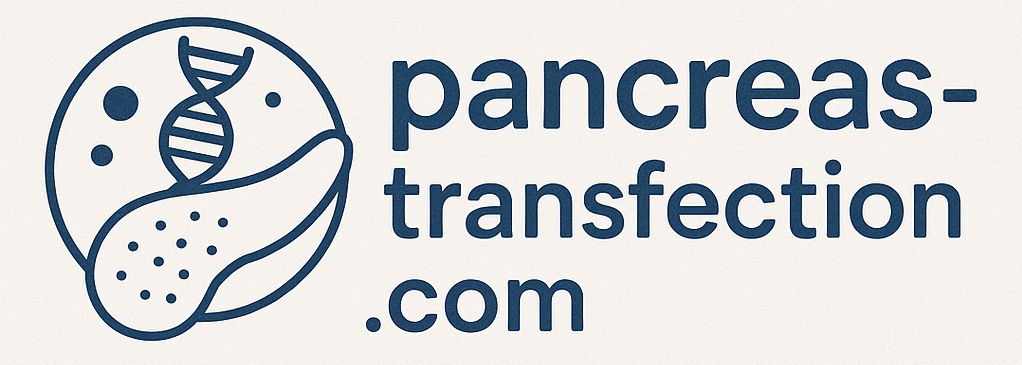What is Transfection?
Transfection is a fundamental molecular biology technique used to introduce nucleic acids — such as DNA or RNA — into eukaryotic cells. This process enables the temporary or stable expression of genes and is vital for studying gene function, protein expression, and cellular behavior. Transfection is commonly achieved through chemical, physical, or viral methods. For biomedical applications, non-viral lipid- or polymer-based transfection reagents are preferred due to their lower immunogenicity and ease of use.
Altogen Biosystems specializes in the development of high-efficiency transfection reagents that are optimized for specific cell lines, including hard-to-transfect cells. These reagents are widely used in academic research, biotechnology development, and preclinical studies.
What is Pancreas Transfection?
Pancreas transfection refers to the targeted delivery of nucleic acids into pancreatic cells, either in vitro (cell culture) or in vivo (within live animal models). The pancreas, a critical organ involved in glucose regulation and digestive enzyme secretion, plays a central role in both metabolic disorders and cancer research. Pancreatic cells, including ductal adenocarcinoma lines such as PANC-1, AsPC-1, and BxPC-3, are notoriously difficult to transfect due to their dense cytoskeletal structure and low division rate.
Altogen’s pancreas-specific transfection kits provide a highly effective solution for this challenge. These kits include reagents formulated for both in vitro transfection of pancreatic cancer cell lines and in vivo delivery into pancreatic tissue. Optimized for high gene expression and minimal cytotoxicity, these kits are used extensively in translational research focused on pancreatic cancer, gene therapy, and drug delivery studies.
What are Transfection Kits?
Transfection kits are specialized laboratory tools designed to introduce nucleic acids—such as DNA, RNA, or siRNA—into eukaryotic cells. This process enables researchers to study gene expression, gene silencing, and protein function in both in vitro (cell culture) and in vivo (animal model) systems. Each kit typically includes a transfection reagent (often lipid-based or polymer-based), buffers, and protocols optimized for specific cell lines or tissue types.
High-Efficiency Transfection Solutions for Pancreatic Research
Altogen Biosystems offers a suite of specialized transfection kits tailored for pancreatic research applications. These kits are optimized for both in vitro and in vivo studies, facilitating efficient delivery of genetic material into pancreatic cells and tissues. Leveraging advanced formulations, Altogen’s transfection reagents ensure high transfection efficiency with minimal cytotoxicity, supporting a wide range of research endeavors from gene expression studies to therapeutic development.
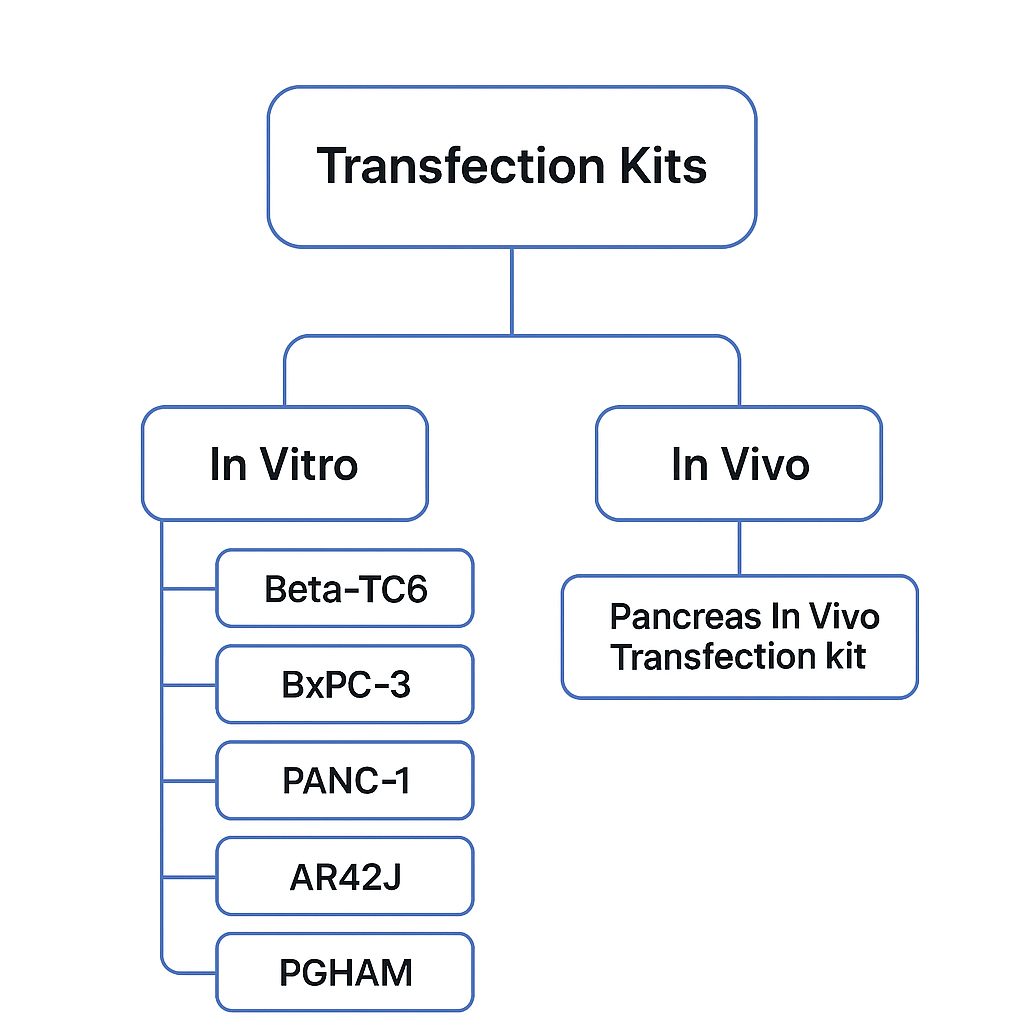
In Vitro Transfection Kits for Pancreatic Cell Lines
Altogen’s in vitro transfection kits are meticulously designed for specific pancreatic cell lines, ensuring optimal performance and reproducibility.
Beta-TC6 Transfection Kit
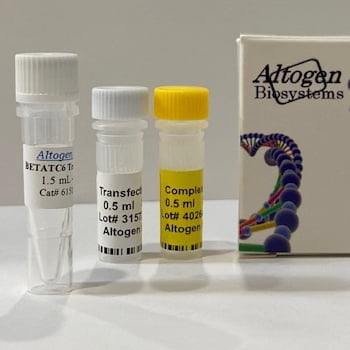
Description: Suited for the mouse pancreatic beta-cell line Beta-TC6.
Features:
- Facilitates high-efficiency transfection.
- Minimal cytotoxic effects.
Applications: Ideal for diabetes research and studies on insulin secretion.
Learn More: Beta-TC6 Transfection Kit
AsPC-1 Transfection Reagent
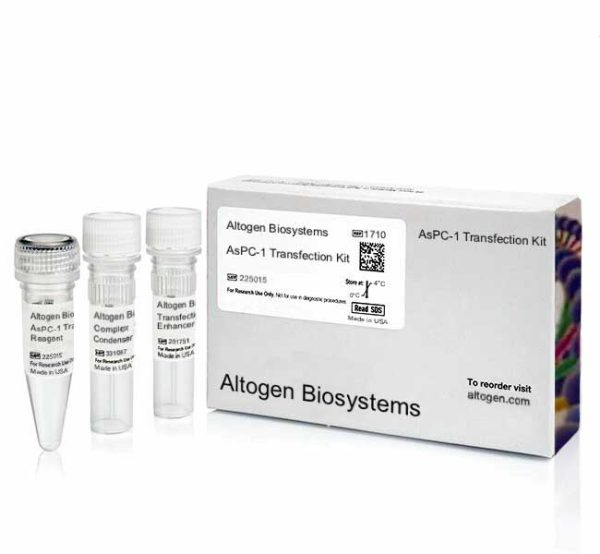
Description: Optimized for the human pancreatic adenocarcinoma cell line AsPC-1.
Features:
- Nanoparticle-based liposome formulation ensures high transfection efficiency.
- Includes Transfection Enhancer and Complex Condenser to improve delivery of DNA, RNA, siRNA, and mRNA.
- Validated for absence of nuclease and microbial contamination.
Applications: Ideal for gene expression studies, RNA interference experiments, and therapeutic development in pancreatic cancer research.
Learn More: AsPC-1 Transfection Kit
MIA PaCa-2 Transfection Kit
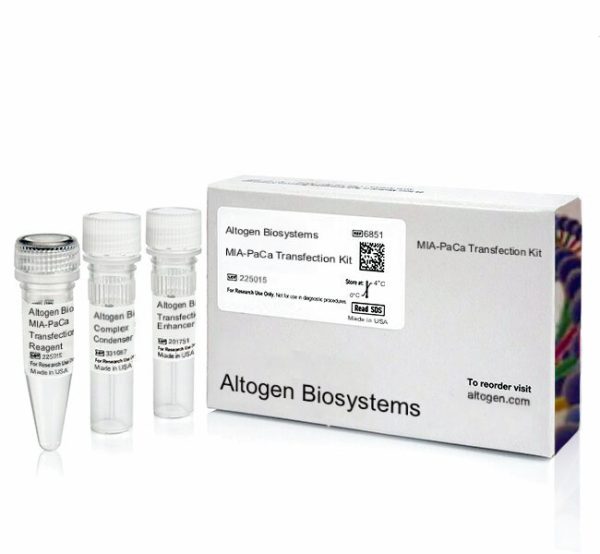
Description: Optimized for the MIA PaCa-2 human pancreatic carcinoma cell line, commonly used in pancreatic cancer research.
Features:
- High-efficiency, low-toxicity cationic lipid formulation
- Includes Transfection Enhancer and Complex Condenser
- Functionally validated with siRNA targeting Lamin A/C, GAPDH, Cyclophilin B
- Free of nuclease and microbial contamination
Applications: Suitable for gene expression, RNAi studies, and therapeutic development
Learn More: MIA PaCa-2 Transfection Kit
PANC-1 Transfection Kit
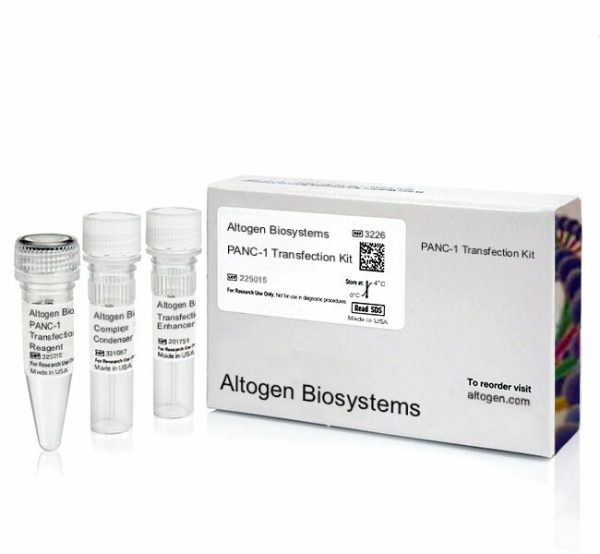
Description: Tailored for the human pancreatic ductal adenocarcinoma cell line PANC-1.
Features:
- Effective delivery of various nucleic acids.
- Includes Complex Condenser and Transfection Enhancer for improved efficiency.
Applications: Ideal for research on pancreatic cancer progression, therapeutic testing, and gene expression analysis.
Learn More: PANC-1 Transfection Kit
BxPC-3 Transfection Kit
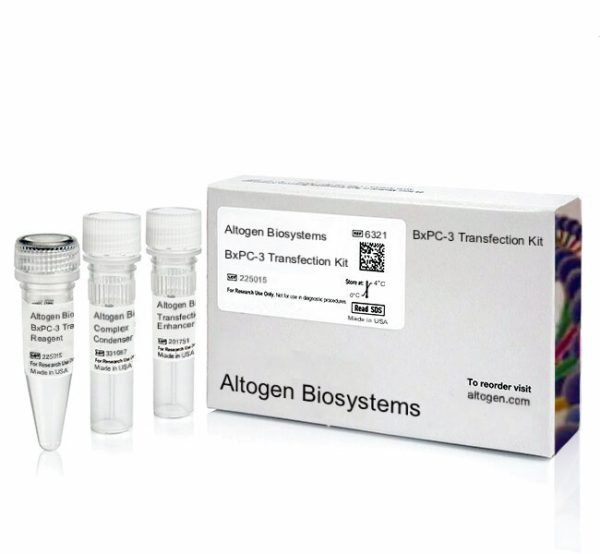
Description: Designed for the hamster pancreatic carcinoma cell line PGHAM-1.
Features:
- High transfection efficiency with low cytotoxicity.
- Suitable for siRNA and plasmid DNA delivery.
Applications: Useful in studies modeling human pancreatic ductal adenocarcinoma.
Learn More: PGHAM Transfection Kit
Capan-1 Transfection Reagent
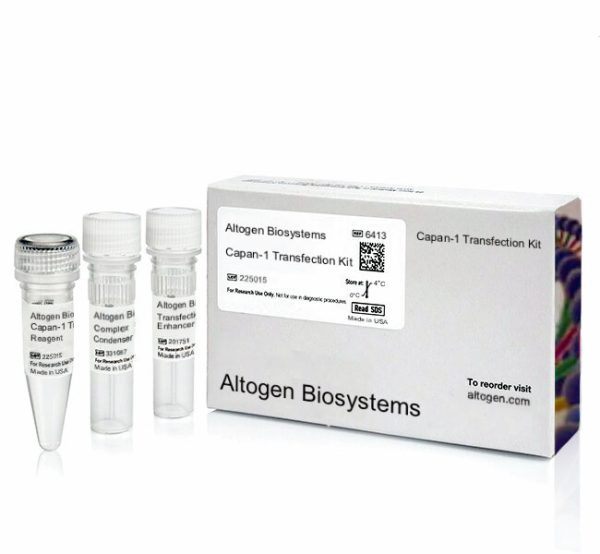
Description: Designed for high-efficiency transfection of the Capan-1 human pancreatic adenocarcinoma cell line.
Features:
- Delivers siRNA, shRNA, miRNA, mRNA, and plasmid DNA effectively
- Includes Transfection Enhancer and Complex Condenser
- Validated ≥89% siRNA delivery efficiency (qRT-PCR)
- Supports both standard and reverse transfection protocols
Applications: Ideal for RNAi, gene expression studies, and therapeutic development
Learn More: Capan-1 Transfection Kit
AR42J Transfection Kit
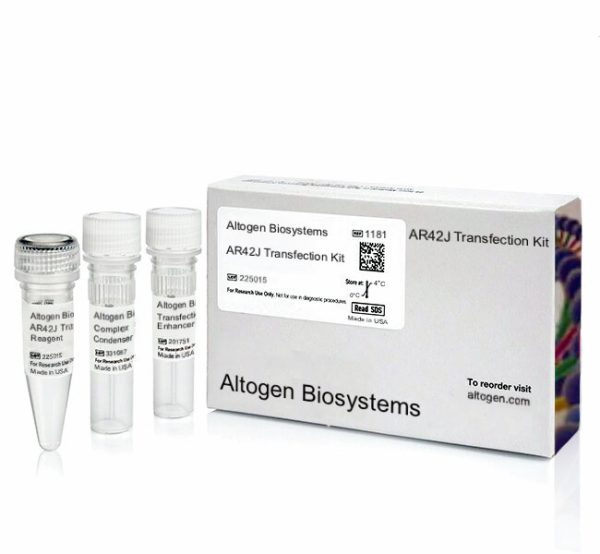
Description: Developed for the rat pancreatic carcinoma cell line AR42J.
Features:
- Optimized for efficient gene delivery.
- Compatible with various nucleic acid types.
Applications: Applicable in research focusing on pancreatic enzyme secretion and signal transduction.
Learn More: AR42J Transfection Kit
PGHAM Transfection Kit
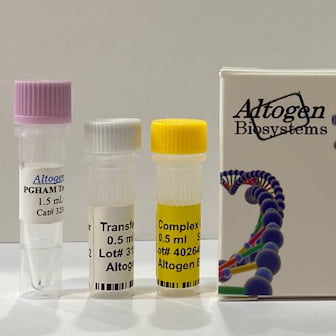
Description: Designed for the hamster pancreatic carcinoma cell line PGHAM-1.
Features:
- High transfection efficiency with low cytotoxicity.
- Suitable for siRNA and plasmid DNA delivery.
Applications: Useful in studies modeling human pancreatic ductal adenocarcinoma.
Learn More: PGHAM Transfection Kit
In Vivo Transfection Kits for Pancreatic Tissue
Altogen Biosystems also provides in vivo transfection kits designed for targeted delivery to pancreatic tissues in animal models.
Pancreas In Vivo Transfection Kit
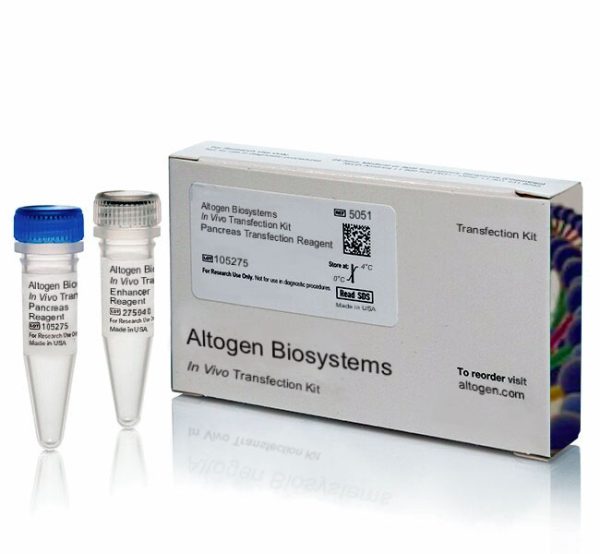
Description: Specialized for delivering genetic material directly to pancreatic tissues in vivo.
Features:
- Advanced formulation ensures efficient intracellular delivery.
- Optimized protocols for consistent results.
Applications: Suitable for gene function studies, therapeutic development, and disease modeling in pancreatic tissues.
Learn More: Pancreas In Vivo Transfection Kit
Why Choose Altogen’s Transfection Kits?
- Optimized Performance: Each kit is tailored for specific cell lines or tissues, ensuring high transfection efficiency.
- Comprehensive Support: Detailed protocols and technical support are provided to facilitate successful experiments.
- Versatility: Compatible with various types of nucleic acids, including siRNA, shRNA, miRNA, mRNA, and plasmid DNA.
- Low Cytotoxicity: Formulations are designed to minimize cellular toxicity, preserving cell viability and function.
Request a Custom Quote
Interested in Altogen’s transfection kits for your research? Request a custom quote to receive detailed pricing and ordering information tailored to your needs.
For more information on Altogen’s full range of products and services, visit altogen.com and altogenlabs.com.
